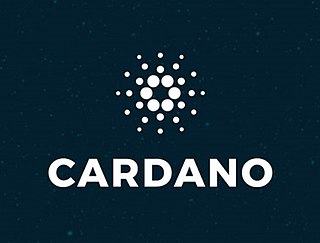
Ethereum is a decentralized blockchain with smart contract functionality. Ether is the native cryptocurrency of the platform. Among cryptocurrencies, ether is second only to bitcoin in market capitalization. It is open-source software.

Stellar, or Stellar Lumens, is an open-source, decentralized protocol for digital currency to fiat money low-cost transfers which allows cross-border transactions between any pair of currencies. The Stellar protocol is supported by a Delaware nonprofit corporation, the Stellar Development Foundation, though this organization does not enjoy 501(c)(3) tax-exempt status with the IRS.
A blockchain is a distributed ledger with growing lists of records (blocks) that are securely linked together via cryptographic hashes. Each block contains a cryptographic hash of the previous block, a timestamp, and transaction data. Since each block contains information about the previous block, they effectively form a chain, with each additional block linking to the ones before it. Consequently, blockchain transactions are irreversible in that, once they are recorded, the data in any given block cannot be altered retroactively without altering all subsequent blocks.
Marc P. Bernegger is a Swiss-based web entrepreneur and Fintech investor. He is known for founding Amiando. He is also known as an advocate of entrepreneurship, FinTech and cryptocurrency in Switzerland.
A distributed ledger is a system whereby replicated, shared, and synchronized digital data is geographically spread (distributed) across many sites, countries, or institutions. In contrast to a centralized database, a distributed ledger does not require a central administrator, and consequently does not have a single (central) point-of-failure.
The Cambridge Centre for Alternative Finance is a research institute established in 2015 as a part of Cambridge Judge Business School, University of Cambridge, United Kingdom. The centre's research focuses on financial channels and instruments that emerge outside traditional financial ecosystems.

Cardano is a public blockchain platform. It is open-source and decentralized, with consensus achieved using proof of stake. It can facilitate peer-to-peer transactions with its internal cryptocurrency, ADA.
The Lightning Network (LN) is a payment protocol built on the bitcoin blockchain. It is intended to enable fast transactions among participating nodes and has been proposed as a solution to the bitcoin scalability problem.
A cryptocurrency wallet is a device, physical medium, program or an online service which stores the public and/or private keys for cryptocurrency transactions. In addition to this basic function of storing the keys, a cryptocurrency wallet more often offers the functionality of encrypting and/or signing information. Signing can for example result in executing a smart contract, a cryptocurrency transaction, identification, or legally signing a 'document'.

Gavin James Wood is an English computer scientist, a co-founder of Ethereum, and creator of Polkadot and Kusama.

IOTA is an open-source distributed ledger and cryptocurrency designed for the Internet of things (IoT). It uses a directed acyclic graph to store transactions on its ledger, motivated by a potentially higher scalability over blockchain based distributed ledgers. IOTA does not use miners to validate transactions, instead, nodes that issue a new transaction on the network must approve two previous transactions. Transactions can therefore be issued without fees, facilitating microtransactions. The network currently achieves consensus through a coordinator node, operated by the IOTA Foundation. As the coordinator is a single point of failure, the network is currently centralized.
Hashgraph is a distributed ledger technology that has been described as an alternative to blockchains. The hashgraph technology is currently patented, is used by the public ledger Hedera, and there is a grant to implement the patent as a result of the Apache 2.0's Grant of Patent License so long as the implementation conforms to the terms of the Apache license. The native cryptocurrency of the Hedera Hashgraph system is HBAR.
A blockchain is a shared database that records transactions between two parties in an immutable ledger. Blockchain documents and confirms pseudonymous ownership of all transactions in a verifiable and sustainable way. After a transaction is validated and cryptographically verified by other participants or nodes in the network, it is made into a "block" on the blockchain. A block contains information about the time the transaction occurred, previous transactions, and details about the transaction. Once recorded as a block, transactions are ordered chronologically and cannot be altered. This technology rose to popularity after the creation of Bitcoin, the first application of blockchain technology, which has since catalyzed other cryptocurrencies and applications.
Nano is a cryptocurrency characterized by a directed acyclic graph data structure and distributed ledger, making it possible for Nano to work without intermediaries. To agree on what transactions to commit, it uses a voting system with weight based on the amount of currency an account holds.
Blockchain analysis is the process of inspecting, identifying, clustering, modeling and visually representing data on a cryptographic distributed-ledger known as a blockchain. The goal of blockchain analysis is to discover useful information about different actors transacting in cryptocurrency. Analysis of public blockchains such as Bitcoin and Ethereum is typically conducted by private companies like Chainalysis, TRM Labs, Elliptic, Nansen, CipherTrace, Elementus, Dune Analytics, CryptoQuant, and Ormi Labs.

Tron is a decentralized, proof-of-stake blockchain with smart contract functionality. The cryptocurrency native to the blockchain is known as Tronix (TRX). It was founded in March 2014 by Justin Sun and since 2017 has been overseen and supervised by the TRON Foundation, a non-profit organization in Singapore, established in the same year. It is open-source software.
Algorand is a proof-of-stake blockchain and cryptocurrency. Algorand's native cryptocurrency is called ALGO.
Chainlink is a decentralized blockchain oracle network. Chainlink's token is on Ethereum. The network is intended to be used to facilitate the transfer of tamper-proof data from off-chain sources to on-chain smart contracts.
Wakefield Scott Stornetta is an American physicist and scientific researcher. His 1991 paper "How to Time-Stamp a Digital Document”, co-authored with Stuart Haber, won the 1992 Discover Award for Computer Software and is considered to be one of the most important papers in the development of cryptocurrencies.






